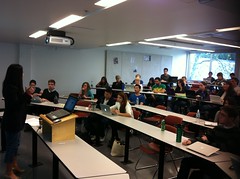 During my tenure at The University of British Columbia’s Department of Political Science I taught some of the most applied courses in the undergraduate curriculum. This was partly luck, because the department needed me to teach those types of course, and partly my own design. Even if the courses were theoretical (like Global Environmental Politics, POLI 375A), I always made sure to include a component that was applied (writing policy reports, creating synthetic index cards on policy issues for busy politicians and bureaucrats, researching and synthesizing data and presenting it in the form of a policy memorandum). At CIDE Región Centro, I plan to do the same: build courses that teach employable skills.
During my tenure at The University of British Columbia’s Department of Political Science I taught some of the most applied courses in the undergraduate curriculum. This was partly luck, because the department needed me to teach those types of course, and partly my own design. Even if the courses were theoretical (like Global Environmental Politics, POLI 375A), I always made sure to include a component that was applied (writing policy reports, creating synthetic index cards on policy issues for busy politicians and bureaucrats, researching and synthesizing data and presenting it in the form of a policy memorandum). At CIDE Región Centro, I plan to do the same: build courses that teach employable skills.
 Anyone who has taken courses with me (or who has worked with me in any capacity, as a research assistant or as an academic colleague) knows I’m obsessed with providing my students (both undergraduate and graduate) with a set of employable or hire-able skills. I also always invite high-level officials, bureaucrats and politicians to guest lecture in my courses because I know from experience that networking is a key pathway to gaining employment.
Anyone who has taken courses with me (or who has worked with me in any capacity, as a research assistant or as an academic colleague) knows I’m obsessed with providing my students (both undergraduate and graduate) with a set of employable or hire-able skills. I also always invite high-level officials, bureaucrats and politicians to guest lecture in my courses because I know from experience that networking is a key pathway to gaining employment.
In fact, (who you know actually does matter, you know, Granovetter and the strength of weak ties and all that).
While I don’t do research on public policy issues related to the workforce and employment, I know enough from my own experience talking to undergraduate students and graduate who have taken my courses that their main concern is whether they will be able to get a job after graduation. This is not a small nor unwarranted concern. There are plenty of reasons to be worried. From Statistics Canada’s website:
The percentage of all Canadian youth age 15 to 29 that are neither in education nor employment (NEET) has ranged between 12% and 14% over the past decade, a rate that is relatively low among the G7 countries.
In Mexico, people neither in education nor employment (NEET) are designated “NINI” (Ni Estudian Ni Trabajan, an exact translation of the NEET acronym). At CIDE, Dr. Eva Arceo has done some research on NINIs, finding that 28.5% of the total population (8.6 million people) in the bracket are NiNis. Not a promising statistic, if you ask me.
I know that as a professor, I’m judged by the quality of my teaching (whatever that means), the soundness and robustness of my research programme and my contributions to the scholarly community. But I can’t help that even as I transitioned to my current position CIDE Región Centro I remain obsessed with helping my students land jobs. Articles like this thoughtful piece on Canada’s youth employment prospects aren’t helping me feel more at ease about my students’ prospects as they graduate. Neither in Canada nor in Mexico!
You may notice that among the key pieces of advice I give my undergraduate and graduate students is always to network. But networking is not enough. I wonder what else can we do as professors to help our students land jobs. Personally, I think it’s part of our duty as faculty members. Some of my fellow colleagues may disagree with me, and I am open to hearing from all viewpoints.
Maybe I’m obsessed because I have the mentoring ethic of my parents: once you agree to mentor someone, it’s a lifelong contract. Even to this day, I continue to write letters of reference for my former students at UBC and elsewhere. I still work to find ways to connect them to potential sources of employment. For whatever it is worth, I think it’s also part of my job and of the service I owe to my community.
Comments, as always, most welcome.
UPDATE: Below the Storify of my conversation with Edward Carr, Neil Sandell and Marc Bellemare on Twitter.
What employable skills should our students graduate with?
A summary of a conversation prompted by Neil Sandell’s post on The Toronto Star on Canada’s youth unemployment.
Storified by Dr Raul Pacheco-Vega · Sun, Dec 02 2012 07:29:08

Great post Dr. Pacheco-Vega, If all professors thought and taught like you I believe our university grads would be much better off. Unfortunately that would not be enough. University education needs to be completely reformed; coop programs and internships should be mandatory (and coop programs need to be improved), classes such as career preparation, business/entrepreneurship basics, etc. need to become part of an arts curriculum, and students have to be assisted by their university after they graduate to land jobs in their field. To be honest I loved the education I received at UBC, it was a world class theoretical education. However, if I could do it all again I may have chosen a career or technical college that teaches hireable skills, puts you in the job market fast, and is less of a debt burden.
Thanks again for sharing your thoughts, a very important topic for all of us university students and new grads.